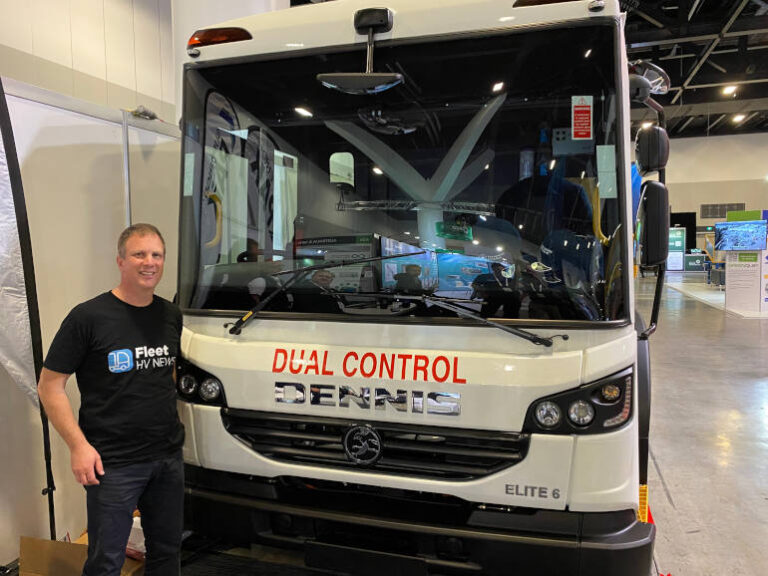At the 2024 Australasian Waste and Recycling Expo in Sydney I decided to sit the cabin of the Dennis Eagle waste truck to learn more about the industry and understand the benefits a low entry cabin and dual control steering.
Shannon Mair, Head of Fleet at Penske Australia and New Zealand, explained that the truck was on its way to the City of Ballarat so we discussed the benefits the Dennis Eagle would provide to local government fleets that collected their own waste.
Marc: What makes the Dennis Eagle waste truck a great option for local government fleets collecting their own waste?
Shannon: Dennis Eagle trucks are specifically designed for waste collection. Unlike generic trucks converted for waste applications, Dennis Eagle trucks are built from the ground up with waste collection in mind. This focus is reflected in features like the low-entry cab, which enhances safety and provides a five-star direct vision rating from Transport for London (CLOCS-A). This rating is a testament to the truck’s superior visibility, allowing drivers to see vulnerable road users such as cyclists and pedestrians, enhancing overall safety.
Marc: How does the low-entry cab design contribute to the truck’s safety features?
Shannon: The low-entry cab design offers a full panoramic view and positions the driver closer to the ground. This design helps drivers make eye contact with pedestrians, especially children who are often fascinated by garbage trucks. The ability to see more clearly around the truck significantly improves safety during operation.
Marc: Can you explain the environmental benefits of the new Euro 6 engine in the Dennis Eagle trucks?
Shannon: The Euro 6 engine upgrade in Dennis Eagle trucks provides substantial environmental benefits. Operators have reported a 5-15% improvement in fuel efficiency. Additionally, the oil drain intervals have doubled from 500 to 1000 hours, reducing the frequency of oil changes and the environmental impact of disposing of used oil. These improvements lead to cost savings and less environmental burden.
Marc: What feedback have you received from drivers about the transition from the Euro 5 to the Euro 6 engines?
Shannon: Drivers have given positive feedback about the Euro 6 engines, noting a significant improvement in acceleration and performance. This better performance helps in the waste collection process, making the trucks more efficient and easier to operate.
Marc: What additional safety features does the Dennis Eagle waste truck offer?
Shannon: Beyond the standard safety features like Electronic Stability Control, which is now an ADR requirement, Dennis Eagle trucks include advanced driver-assist features. These features encompass emergency braking, lane departure warning, and enhanced stability control, all of which contribute to a safer driving experience.
Marc: How do local governments typically utilise garbage trucks, and how does this impact the choice of vehicle?
Shannon: Local governments often run their garbage trucks intensively, with side-loaders operating five days a week for about 10 hours a day, and rear-loaders working six days a week for the same duration. Given this heavy usage, choosing a reliable and efficient vehicle like the Dennis Eagle is crucial. For instance, City of Ballarat has recently purchased Dennis Eagle trucks, showcasing their trust in the vehicle’s performance and durability for local government use.






